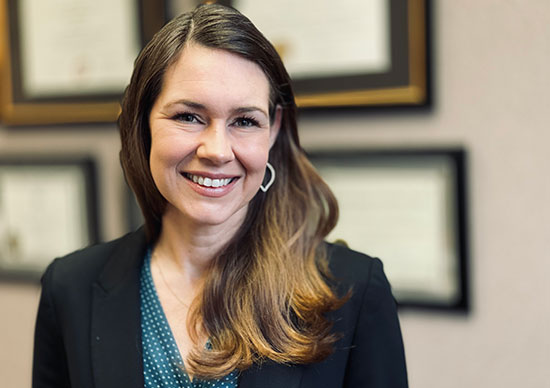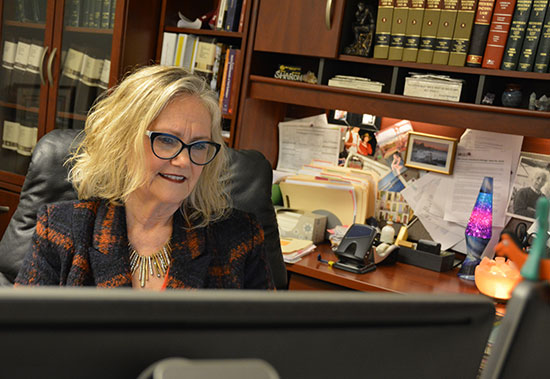
April 7, 2021 – The legal profession is not known for its rapid adoption of technology. After all, much of the law is based on precedent to guide future decisions. There wasn’t much guidance for the unprecedented times of COVID-19. But much has changed.
In the legal sphere, like many other professional service industries, the rapid implementation of new technology has been a common theme in the last year.
“As never before, we were forced to rethink how legal services are delivered and how justice is administered,” wrote Bob Ambrogi recently in Wisconsin Lawyer.
“The silver lining of 2020 is that we have been forced to consider changes that were long overdue and then given the opportunity to implement those changes,” noted Ambogi, a lawyer and legal technology writer.
The Wisconsin Court System, for instance, is contemplating the continued use of videoconferencing technology for court hearings that do not require in-person appearances, even after the pandemic ends. A petition is currently pending.
Such changes would allow courts to be more flexible moving forward. Over the past year, flexibility was a key element for solo and small firms navigating the pandemic.
“It has been vital to be open and flexible to meet clients’ needs despite communication issues, lockdowns, staff shortages, and other issues arising over the business of practicing law,” said Robyn De Vos of Crooks, Low & Connell S.C. in Wausau.
“This past year has given us great experience in being able to adapt our practice to a rapidly changing climate,” noted De Vos, one of four attorneys in her firm.
While law firms continue to face pandemic-related challenges, the last year has highlighted areas in which firms can create efficiencies moving forward.

“This past year has given us great experience in being able to adapt our practice to a rapidly changing climate,” said Robyn De Vos of Crooks, Low & Connell S.C. in Wausau.
Best Path Forward
One year ago, Gov. Tony Evers issued a “Safer at Home” order. Legal services were exempt from the order, which meant lawyers could still work from their law offices and clients could still leave their homes to receive legal services with some restrictions.
 Joe Forward, Saint Louis Univ. School of Law 2010, is a legal writer for the State Bar of Wisconsin, Madison. He can be reached by email or by phone at (608) 250-6161.
Joe Forward, Saint Louis Univ. School of Law 2010, is a legal writer for the State Bar of Wisconsin, Madison. He can be reached by email or by phone at (608) 250-6161.
But the uncertainty of that time period was disconcerting as lawyers shifted gears to provide more services through videoconferencing platforms and other online tools.
“I am navigating the need to keep my business open with the reality that clients, not all, but some, do not see me as a priority place to spend their money in uncertain times,” said Johanna Kirk, a solo practitioner in Superior, in an article published a year ago.
Mary Poletti, a family law attorney at Nickolai & Poletti LLC, a four-attorney firm in Burlington, said her firm’s bankruptcy practice dropped off considerably in the last year and a Paycheck Protection Program (PPP) loan kept the firm from running a deficit.
In 2020, Wisconsin’s federal bankruptcy courts had about 5,000 fewer bankruptcy filings than it did in 2019.
U.S. bankruptcy filings in 2020 hit a 35-year low due in large part to government-funded COVID-19 relief packages and other aid as businesses closed or suspended operations and a record number of people sought unemployment insurance benefits.
“We have been in the office every day, but have also used remote tools like more telephone conferences and Zoom meetings,” Poletti said. “Keeping a rainy day fund and a variety of practice areas as options seem like wise choices going forward.”

“I hate to say it, but the COVID situation has been beneficial to my practice because it has made court hearings more efficient,” said Roberta Heckes, a solo attorney based in the rural town of Thorp, west of Eau Claire and in close proximity to some of her farming clients.
Now, law firms still face challenges, but adoption of new technologies, by necessity, has allowed them to thrive with more knowledge and more confidence.
“I was able to navigate some very crazy weeks in a respectable fashion without losing my mind – or my cool,” said Carol Skinner, an employment lawyer in Hudson.
“My clients and I felt like we were in this together. We got through it with good results, as far as both employers, and their employees were concerned.”
But Skinner noted the stress of guiding clients in a rapidly changing environment. “The lack of clear requirements from any federal source regarding handling COVID issues in the workplace has been a bit of a nightmare,” Skinner said.
When questions arose – and they did often throughout the year – Skinner would scroll furiously through state and federal government websites, searching for the most recent guidance. In a pandemic world without absolutes, her bottom line advice was this:
“The best path forward is to do the very best you can, with the information at hand, and treat your employees as if they were your son or daughter looking for answers,” said Skinner of Skinner and Associates.

“My law firm was already virtual/remote in that everyone worked from home, so the pandemic did not change anything from the standpoint of the actual practice of law, but it has changed in terms of human interaction,” said Nate Cade of Cade Law Group LLC in Milwaukee.
Zooming into the Future
Zoom and other videoconferencing tools have been widely used by many lawyers required to appear via Zoom for court hearings and stay connected with clients.
The increased and continued use of videoconferencing may improve firm efficiencies and provide access to justice solutions, but Zoom cannot replace in-person connections, even for firms using the virtual law office model prior to the pandemic.
“The biggest challenge has been the inability to physically see and dine with my team members or clients,” said Nate Cade of Cade Law Group LLC in Milwaukee. Cade is a civil litigator who focuses on product liability and commercial and business disputes.
“My law firm was already virtual/remote in that everyone worked from home, so the pandemic did not change anything from the standpoint of the actual practice of law, but it has changed in terms of human interaction,” Cade said.
For instance, Cade hired an intern in March 2020, and he has not seen her since her welcome lunch. “While we chat on the phone and do video calls, the human interaction is missing. It prevents her from getting to know me and my colleagues on a personal level,” he said. “That’s tough at the beginning of one’s career.”

“[M]y clients needed some time to be convinced that they needed to continue to do what they do,” said Randy Nesbitt of Door Kewaunee Municipal Law S.C. in Sturgeon Bay. In this photo, Nesbitt gets help from his granddaughter at the home office.
Cade said there’s a lot to be gained from meeting with and having lunch, dinner, or drinks with your colleagues, staff and clients. At the same time, he welcomes continued use of Zoom and other technologies to create efficiencies for his law practice.
“It is now clear to most judges that most court hearings can be done by a simple video call, and lawyers are not required to traipse down to the courthouse or far away counties for simple hearings, like scheduling conferences,” Cade noted.
“If in-person appearances are needed, it can be saved for major motion hearings, like summary judgment,” Cade noted. “I also learned that clients have easily adapted to the remote/virtual environment, and I am busier now than ever before.”
Roberta Heckes, a solo attorney based in the rural town of Thorp, west of Eau Claire, said one of her biggest challenges was just getting comfortable with Zoom.
But her practice is now more efficient. “It has made things cost effective for my clients by saving lawyer time wasted in travel and waiting time in court,” she said.
“I hate to say it, but the COVID situation has been beneficial to my practice because it has made court hearings more efficient.”

“COVID has forced much of the population to believe in, face, and plan for their own mortality. ... Unfortunately, I have opened at least four probates with COVID-related deaths,” said Sharon Greene-Gretzinger, a solo practitioner in Shawano.
Lessons Learned
Sharon Greene-Gretzinger, a solo practitioner in Shawano, about 43 miles northwest of Green Bay, panicked when the first orders came down regarding court closures and schedules. “I thought I would end up spending my savings to pay my assistant, but as turns out, I never closed and my office was busier than ever,” she said.
Like many others, she’ll continue to use and explore technology. “One lesson I have learned is how to conduct meetings and hearings via Zoom or other collaborative software,” Greene-Gretzinger said.
She also said COVID-19 triggered a huge spike in estate planning clients. “COVID has forced much of the population to believe in, face, and plan for their own mortality,” she said. “Unfortunately, I have opened at least 4 probates with COVID related deaths.”
For Randy Nesbitt of Door Kewaunee Municipal Law S.C. in Sturgeon Bay, COVID-19 has taught him keep moving forward, even if circumstances alter the direction ahead.
“As a solo practitioner, I didn’t have social distancing concerns with my business, but my clients needed some time to be convinced that they needed to continue to do what they do,” Nesbit said. “The world will move on regardless of temporary roadblocks.”

“My clients and I felt like we were in this together. We got through it with good results, as far as both employers, and their employees were concerned,” said Carol Skinner, an employment lawyer in Hudson.
Christopher Shattuck, practice management advisor for the State Bar of Wisconsin’s Law Office Management Assistance Program (Practice 411™) has kept busy the last year, helping lawyers pinpoint and understand the right technology for their firms.
“We saw firms adopt videoconferencing out of necessity, and realize the efficiencies,” Shattuck said. “Moving forward, I think we’ll see much more willingness to embrace technology as law firms explore ways to create efficiencies and maximize productivity.”
Shattuck recently explored practice area trends in his Wisconsin Lawyer article, “What’s Hot, What’s Not: Wisconsin Practice Trends 2021.”
